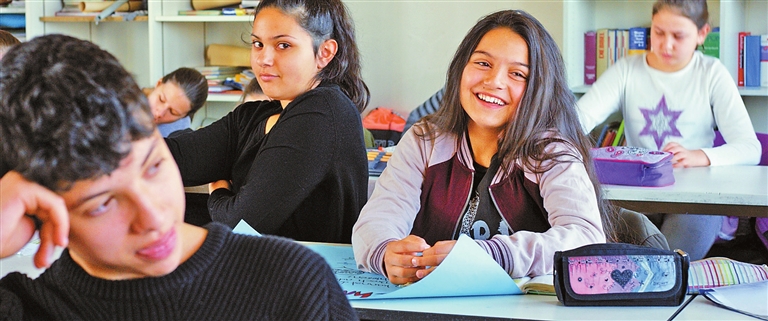
Filmmaker Maria Speth brought her documentary crew to a provincial German school for open-ended observation. The result — “Mr. Bachmann and His Class” — won the Silver Bear Jury Prize at Berlinale. The film introduces us to the industrial town of Stadtallendorf in central Germany, before zeroing in on Class 6B of the Georg Buchner School, where Speth’s friend Dieter Bachmann has been a teacher for 17 years. Speth draws us into a world without providing even basic explanatory titles, leaving us to find out who’s who, what’s what and why it matters. After a quick sketch of the setting, Speth plunges the viewer into a class discussion driven by Bachmann in cargo pants, hoodie and knit cap. The subject is an improvised modern-day parable about an electric guitar and a table, whose real-world relevance the children will gradually piece together. This is an exercise not just in storytelling and critical thinking but in German, which isn’t the first language of most of the students. Their family roots are elsewhere: Turkey, Bulgaria, Russia, Morocco, Sardinia, Romania, Kazakhstan and Brazil. The students taught by Mr. Bachmann and another teacher are aged from 12 to 14. Technically this is an elementary school, but Americans might discern a middle school or junior high school vibe. In the school’s comprehensive approach, students at various levels, particularly in terms of their grasp of German, are taught together. It’s up to Bachmann and his colleagues to recommend who will graduate to high school. That’s a responsibility he takes seriously, even as he stresses to his students that their grades are “just snapshots” and don’t reflect who they truly are. Bachmann arranges his class schedule to include time for his students to read books to themselves. The classroom has the inviting feel of a hangout, Bachmann’s wood carvings among its casual adornments. A table in the corner holds fixings for tea, a couch is available for anyone who needs a rest, and a drum set, guitars and other instruments occupy a corner where various combinations of students and teacher jam out. Most of Speth’s documentary takes place within that classroom, but she also captures some of the students in outside pursuits: one boy practicing his moves in a dance studio, another pursuing his dream at a local boxing gym. The students’ parents are seen only when they visit the school, for parent-teacher conferences and a class party — and music features in both instances. Later in the film, Bachmann will reveal to his students his own Polish family’s place in the migrant town’s history. The documentary chronicles Bachmann’s final months in the job. In its sap-free way, the film is a comfort, an inspiring testament to the way the right teacher at the right time might be one of life’s greatest gifts. As 14-year-old Hasan, seated beside his 65-year-old teacher, declares with feeling, “We did good things in this room.” (SD-Agencies) | 
